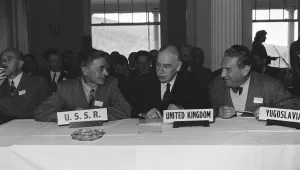International Security is America's leading peer-reviewed journal of security affairs.

National leaders often exhibit fatalism, or the belief that events are guided by forces beyond their control. Fatalism may reflect reality, or it may be rhetoric to boost support. But there is also an important psychological explanation: fatalism can help leaders avoid responsibility for costly outcomes and protect their self-image. Fatalism is more likely: (1) in regard to bad outcomes versus good outcomes; (2) when war is seen as imminent versus far-off; and (3) in nondemocratic regimes versus democratic regimes.
Dominic Tierney, "The Iron Dice: Fatalism and War," International Security, Vol. 49, No. 1 (Summer 2024), pp. 51–90.





